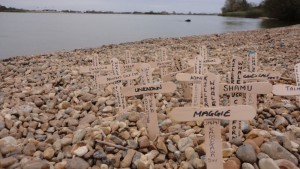NEW KILLER WHALE AND DOLPHIN SHOW TO OPEN IN BOGNOR REGIS, UNITED KINGDOM, IN 2013
Today (Friday 8 June) is World Oceans Day, an annual event conceived by the Ocean Project and the World Ocean Network, both of which have supporting partners that include aquariums and marine parks that profit from entertainment using captive whales and dolphins.
Whilst the headline above is purely fiction, current laws in the United Kingdom wouldn’t preclude any organisation – Sea World or Marineland for example, from applying for planning permission to open an entertainment complex that featured captive cetaceans similar to those in existence in many countries around the world.
Earthrace Conservation, the marine conservation organisation founded by ‘whale warrior’, Pete Bethune, is taking the opportunity offered by World Ocean Day to highlight those countries which still allow both captive breeding and the taking from the wild of cetaceans to use as money-making tools under the guise of educating people about life in the oceans.
In 59 countries around the world, there are well over 2,000 dolphins held in unsuitably small tanks, a number of which have been captured from the wild from the now infamous Japanese coastal town of Taiji.
There are currently seven countries that keep a total of 42 orcas (killer whales) in captivity – led by the US which has 21. There are 161 beluga whales in captivity, 42 in Canada and 31 in the US. This figure increased temporarily by one last month (May) when a beluga calf was born at the Georgia Aquarium. It died five days after birth.
Earthrace Conservation is launching a global campaign this Summer to persuade everyone, especially young people, to boycott marine theme parks, hotels, aquariums and any other facilities around the world which include whale and dolphin shows as part of their ‘entertainment package’.
Earthrace UK spokesperson, Lucy Byrne, said: “With so much easily accessible material designed to educate people of all ages about life in our oceans via the media of video, film and the internet, there is no legitimate reason for any country to continue to allow the use of these incredible marine mammals purely for profit.
“Earthrace deplores the inhumane practice of incarcerating marine mammals in ‘tanks of shame’ and asks everyone who was planning to include a trip to see whales or dolphins held in captivity within their Summer holiday plans to be part of the next wave for change by refusing to add to the profits of their captors.”
Pete Bethune said: “Compared to the lives they have in the oceans, where all whales and dolphins should be, the conditions in which they exist in captivity are like the worst jails in the world with a life sentence of forced labour on top. To pretend that there is any educational merit in paying huge prices to watch dolphins and whales jump through hoops is ridiculous.”
Media notes
Earthrace UK have an installation piece designed to highlight the number and names of dolphins and whales that have died in captivity around the world (names courtesy of www.ceta-base.com).
EARTHRACE calls for:
• An International ban on all wild capture and breeding of marine mammals for entertainment, and the sale, trade, and transport of marine mammals for this purpose
• Transparency in the sourcing of all current and future captive marine mammals by all those facilities that currently display them
• Rescue, rehabilitation and release only
Orcas: Seven countries currently keep a total of 42 orcas (killer whales) in captivity:
USA 21
Japan 8
Spain 5
France 4
Canada 2
Netherlands 1
Argentina 1
Beluga whales: 14 countries keep a total of 161 beluga whales as ‘entertainment’ and for profit. The top five are:
Canada 42
(38 of them at Marineland in Ontario)
USA 31
Russia 28
China 24
Japan 20
Dolphins: Kept in captivity in aquariums, zoos, entertainment and theme parks, and hotels, the estimated total number of dolphins held in captivity in 59 countries around the world is a staggering 2,100.
However, many facilities do not publicly reveal how many dolphins they hold, nor how many die. The number of captive dolphins could be considerably higher.
The top ten countries keeping dolphins are:
USA 401
Japan 303
China 274
(295 including 21 in Hong Kong)
Mexico 255
Spain 93
United Arab Emirates 69
Ukraine 68
Australia 53
Russia 39
Netherlands 44
Number of facilities per country holding captive cetaceans – top eight
Japan 49
USA 35
China 27
Canada 23
Russia 16
Ukraine 14
Spain 12
Turkey 10
World Oceans Day: http://worldoceansday.org/
The Ocean Project: www.theoceanproject.org
World Ocean Network: http://oceanmondial.worldoceannetwork.org/EN/accueil.htm
Available photos: Earthrace Conservation UK ‘deaths in captivity’ installation. This will be on display during WhaleFest 2012 in Brighton later this year.
